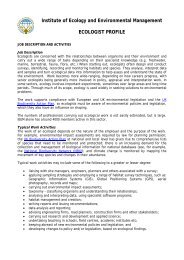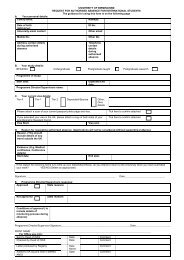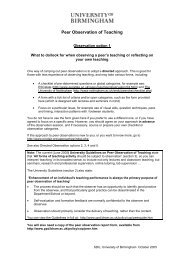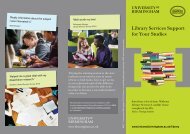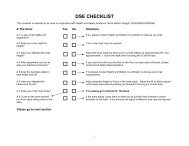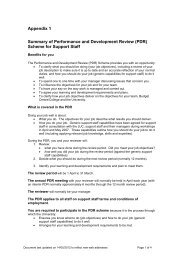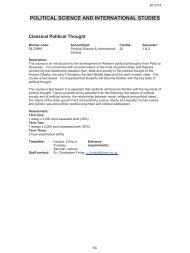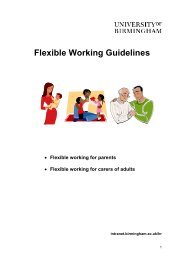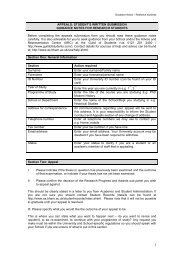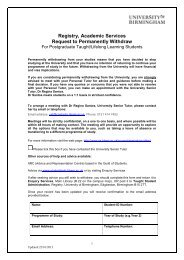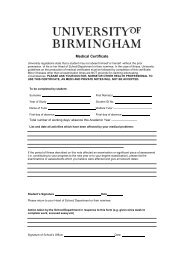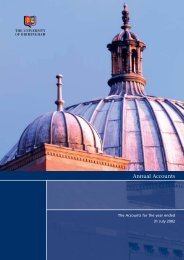Attendance management policy (PDF - 69KB)
Attendance management policy (PDF - 69KB)
Attendance management policy (PDF - 69KB)
You also want an ePaper? Increase the reach of your titles
YUMPU automatically turns print PDFs into web optimized ePapers that Google loves.
INTRODUCTIONATTENDANCE MANAGEMENT POLICY FOR SUPPORT STAFF1. The University’s Strategic Framework 2005-2010 recognises the key role that people at alllevels have in making the University a dynamic and stimulating organisation: “Achievement ofour mission depends upon harnessing the potential of all our staff.” The Human ResourcesStrategy adopted by the University Council in 2007 sets out an “aim to achieve a people-centredculture within the University that protects and enhances the conditions necessary for theachievement of […] excellence […]”.2. The University recognises that, from time to time, employees may suffer ill health or may needto attend doctor’s appointments etc. It also recognises the benefits to the University ofmaintaining or improving the health of the individual.3. The University recognises its duty of care towards employees and is committed to their health,safety and well-being at work. In this respect, the University has developed a Health and SafetyPolicy (available at intranet.birmingham.ac.uk/hr/documents/public/hsu/hs<strong>policy</strong>/0uhsp.pdf),which members of staff are required under their conditions of employment to observe andpromote.4. Consistent with its concern for the health and safety of its staff, the University is committed toachieving its teaching, research and related objectives, in an efficient manner.5. Successful attendance <strong>management</strong> benefits employees because:• - Arrangements can more easily be made to ensure medical conditions are managedsafely within the work place• - Disability-related absences are appropriately managed• - Managers are better able to provide support to employees when they understand thefactors affecting their attendance.• - Good attendance creates a more stable working environment.• - It promotes the teaching and research mission by maximising service provision.6. In dealing with cases of sickness absence among staff, the University will endeavour to besensitive to the circumstances of the individual; and will assume that the absence is for agenuine sickness-related reason (unless evidence of abuse exists, in which case theUniversity’s disciplinary procedure will be invoked). For example, the existence of a doctor’scertificate or other medical evidence will be taken at face value as evidence of sickness/injury.7. The University acknowledges the need to provide guidance and advice to managers who will beprimarily responsible for delivering this <strong>policy</strong>, to ensure that they do so in a supportive manner,and that all members of staff are treated similarly across the University.8. This <strong>policy</strong> applies to those members of staff in the University who are employed underconditions of employment for support staff. The <strong>policy</strong> is based upon the provisions withinsupport staff conditions of employment for sick leave and sick pay. References below to a‘senior manager’ include a College Head of Operations, a Head of Budget Centre, or anyperson designated on their behalf to carry out the specified actions.ATTENDANCE MANAGEMENT POLICY FOR SUPPORT STAFF Page 1 of 7
9. Personal information relating to individual employees, including information relating to sicknessabsence, will be treated by those receiving such information as confidential to the <strong>management</strong>of the University.ABSENCE REPORTING BY EMPLOYEES10. Conditions of employment for support staff specify that a member of staff who is unable toattend work through sickness or injury should notify his/her manager on the first day of absence.Depending on the length of absence, s/he must also provide his/her manager with the followingdocumentation:• For absences of between four and seven calendar days, a personal sickness certificatemust be completed;• For absences of eight or more calendar days, a medical certificate is required;• Where a member of staff is absent for eight or more calendar days but does not obtain amedical certificate until the eighth day, s/he must also provide a personal sicknesscertificate to cover the first seven days of absence.It is the responsibility of the individual to ensure that certificates are submitted promptly. If thereis likely to be a delay for any reason in providing a certificate, the member of staff should informhis/her manager of the reason. Failure to do so may result in pay being delayed or withheld(see paragraphs 44-46 re sick pay).A copy of the University's personal sickness certificate form may be obtained atintranet.birmingham.ac.uk/hr/leave/health/sick-leave.aspx or from your line manager onrequest.11. Within the overall context of this <strong>policy</strong> some Colleges/Schools/Budget Centres may developwritten procedures for reporting sickness absence in consultation with a trade union or otherstaff representative, which must be consistent with this <strong>policy</strong>; and with which the staffconcerned are required to comply.12. In circumstances where an employee attends for work but goes home sick during the workingday, that day will only be counted as sick leave if no work was carried out on that day. Anemployee is expected to notify his/her manager before going home sick: this is important, forexample in relation to emergency (fire) procedures. Repeated occurrences of leaving work earlywill be subject to investigation and appropriate action (e.g. counselling, referral to theOccupational Health Unit, discipline etc).13. It is the responsibility of an employee who is absent on sick leave to keep his/her manager (or adesignated nominee - see paragraph 23) informed, particularly in respect of a change to thelikely date of return to work. This is to enable the University to manage workload in an efficientmanner.14. If an employee receives a statement of fitness for work from his/her general practitioner whichstates that the employee may be fit for work taking account of certain advice, s/he shoulddiscuss the situation with his/her manager. If the advice can be accommodated by theUniversity, the ‘Return to Work’ plan (available from Human Resources on request or viaintranet.birmingham.ac.uk/hr/leave/health/<strong>management</strong>.aspx) should be completed by theindividual’s manager in consultation with the employee as the basis of the return to workarrangements. However, if the manager considers (having taken advice as appropriate from HRand/or Occupational Health) that the advice from the general practitioner cannot beaccommodated, the employee will be regarded as ‘not fit for work’ and will accordingly remainon sick leave, without any need for further immediate certification by the general practitioner.15. On return to work, the employee must notify his/her manager (or a designated nominee – seeparagraph 23) of his/her return to ensure that accurate records are maintained.ATTENDANCE MANAGEMENT POLICY FOR SUPPORT STAFF Page 2 of 7
16. If an employee is aware that s/he will have to be absent on sick leave, e.g. for an operation at afuture date, s/he should provide as much notice as possible to the senior manager to allowappropriate cover arrangements to be made.DISABILITY-RELATED ABSENCE17. Under the Disability Discrimination Act (1995), the University has a responsibility to makereasonable adjustments to workplace practices – including arrangements for attendance<strong>management</strong> – where they place a disabled member of staff at a substantial disadvantagecompared to other members of staff. 118. Within the context of attendance <strong>management</strong>, it is recognised that staff with disabilities may, onoccasion, need to be absent from the workplace for reasons that relate to their disability. Forexample, staff may need to undergo medical treatment, or a change in their condition may meanthey are temporarily unable to work. The University recognises that this type of absence isdistinct from standard sickness absence and, for the purposes of attendance <strong>management</strong>, willconsider and record such absences as ‘disability-related absence’.19. Disability-related absence will still be considered a form of absence under the provisions of this<strong>policy</strong>. However, to ensure that disabled staff are not unreasonably disadvantaged byattendance <strong>management</strong> practices, a greater degree of flexibility will normally be allowed whereabsences are disability-related. In particular:• Where it is needed and reasonable to do so, managers should allow for a greater degree offlexibility in granting permission for disability-related medical appointments during workinghours and any arrangements for making up hours;• Where a disabled member of staff’s absence rate exceeds the trigger points in this <strong>policy</strong>, adecision will be made on a case-by-case basis by the senior manager (followingconsultation with Human Resources) as to whether any disability-related absences shouldbe discounted, and/or if any further action needs to be taken to manage these absences,including reasonable adjustments to working arrangements to support attendance.20. Staff whose absence is disability-related should report their absence in the standard way, asoutlined in paragraphs 10-16 above. Where a disabled member of staff is absent for reasonsnot related to their disability, this will be considered and recorded as a standard sicknessabsence.PREGNANCY-RELATED ILLNESS21. If a member of staff is absent due to pregnancy-related illness (for example, pre-eclampsia), thiswill be considered and recorded as a ‘pregnancy-related illness’ and will not count towards thestaff member’s absence record. This is in accordance with the provisions of the SexDiscrimination Act (1975), which prohibits less favourable treatment on the grounds ofpregnancy. Staff with pregnancy-related illness should still report their absence in the standardway, as outlined in paragraphs 10-16 above.22. Arrangements for taking early maternity leave and pay in the event of pregnancy-related illnessare outlined in the University’s Family Leave Guidelines available atintranet.birmingham.ac.uk/hr/leave/family/ or on request from Human Resources. If a pregnantstaff member is absent due to an illness that is not pregnancy-related, this will be recorded assickness absence in the normal way.1 The Disability Discrimination Act (1995) defines disability as, ‘a physical or mental impairment which has a substantial and long-termadverse effect on the ability to carry out normal day-to-day activities.’ATTENDANCE MANAGEMENT POLICY FOR SUPPORT STAFF Page 3 of 7
MANAGERS DEALING WITH ABSENT EMPLOYEES23. The senior manager will designate a particular individual to be responsible for maintaininginformal contact with an employee who is likely to be absent long term, ie for three or moreweeks; and will inform the absent employee of the name of that individual. The contact personwill ensure that contact is maintained with the absent employee and make every effort to keephim/her informed of work matters as appropriate. Such contact will be made sensitively,according to the nature of the absent employee’s circumstances, and, in the first instance, thismay be by post or email, as appropriate. The primary purpose of this contact is to ensure that amember of staff who is off sick on a long-term basis is kept informed of developments at work,which will aid their re-integration into the work environment when they are fit to return to work.24. In certain circumstances, it may be necessary for the senior manager to contact a member ofstaff who is off sick, eg for purposes of consultation. Such contact will be made sensitively;depending on the nature of the absent employee’s circumstances (for example absence forstress-related or compassionate reasons) this contact may initially be through the contactperson designated under paragraph 23 above.25. If a manager receives information that a member of staff is off sick with stress or a stress-relatedillness (eg anxiety, depression, debility, malaise etc), s/he should immediately report that matterto Human Resources and to the Occupational Health Unit, on the grounds that return to workfrom such illnesses is most successful where the cases are managed at an early stage.26. The University recognises the importance of adopting an inclusive approach to the provision ofinformation and support to staff, including those who may be on sick leave. It may therefore beappropriate on occasion to offer a member of staff who is absent on sick leave the opportunity ofa meeting (which the employee is under no obligation to accept) to inform the member of staffof, and seek his/her views on, developments at work and, where appropriate, to considerarrangements for return to work in due course. Such a meeting may take place, with theconsent of the employee, in the University, at the employee’s home or in some other location.An employee may be accompanied at such a meeting by a friend or union representative.27. In a case where there may be a significant change in the employee’s ability to function in theworkplace (as determined by the manager in discussion with the employee), the ‘Return toWork’ plan (available from intranet.birmingham.ac.uk/hr/leave/health/<strong>management</strong>.aspx or fromHuman Resources on request) should be completed (by the individual’s manager in consultationwith the employee) at the point when the member of staff is able to contemplate a return to workin the relatively near future, to ensure that arrangements for return in due course are properlyplanned.A ‘Return to Work’ plan should also be completed (in consultation with the employee) where anemployee presents a statement of fitness to work from his/her general practitioner which statesthat the employee may be fit for work taking account of certain advice written on the statement,providing the advice can be accommodated by the University. If the advice cannot beaccommodated, the employee will remain on sick leave and the manager should annotate thestatement with the reasons why the advice from the general practitioner cannot beaccommodated. In either case, the statement should be forwarded to the Finance Office/HumanResources in accordance with paragraph 30 below.28. Where absence is disability-related, the University has a duty (under the DisabilityDiscrimination Act) to consider if there are any reasonable adjustments that could be made toworking arrangements to enable the staff member to return to work, for example by providingspecialist equipment or making changes to working hours or the allocation of duties.Occupational Health can advise on what adjustments would be appropriate, or changes may besuggested by the staff member themselves or their GP. If there is a cost attached to any of theATTENDANCE MANAGEMENT POLICY FOR SUPPORT STAFF Page 4 of 7
ecommended adjustments, the government-funded Access to Work scheme may be able tomeet some of these costs. Copies of the University Access to Work guidelines are available onrequest from Human Resources or at intranet.birmingham.ac.uk/hr/documents/public/access-towork.pdf.29. On return to work after each and every period of sickness absence, the senior manager willcontact the employee to ascertain the cause of the absence, that the employee is well again andthat all appropriate arrangements are in place for the employee to re-integrate into the workenvironment. A model form for recording such information is available atintranet.birmingham.ac.uk/hr/leave/health/<strong>management</strong>.aspx or from Human Resources onrequest.ABSENCE MONITORING30. Senior managers are required to maintain absence records and to provide information on absentemployees to the University on a regular (weekly) basis by submitting records and certificates tothe Finance Office (via/copy to Human Resources). The form for this report is available atintranet.birmingham.ac.uk/hr/leave/health/<strong>management</strong>.aspx or from Human Resources onrequest.31. The University is committed to reducing absence levels, particularly short term absences, andsenior managers will therefore investigate any case giving cause for concern, eg where thefollowing ‘triggers’ are met:• - where an employee has had three or more periods of sickness absence or more thanfive days’ sickness in any 13 week period; or• - where an employee has had five or more periods of sickness absence or ten or moredays’ sickness in any 12 month period; or• - where there is a recurrent pattern of sickness absence.32. In investigating such cases, the factors outlined in paragraphs 17-22 will be considered wheredisability-related absences or pregnancy-related illness have contributed to the triggers beingreached. Disability related absence would not lead to disciplinary action but could lead to ahearing under the attendance review procedure.33. Management of absence levels may at any stage include referral (via the relevant Operationsteam in Human Resources) of the employee for assessment by the University’s OccupationalHealth Unit. The individual will be informed by the senior manager that such a referral is to bemade and why.34. Advice will be sought from the Occupational Health Unit in the case of an employee who hasbeen absent for three weeks, which may result in the employee being referred to theOccupational Health Unit at that point, if this has not already taken place.35. Absence monitoring and counselling, and any further action to deal with issues relating topotential incapacity or persistent absence, will be carried out according to the attendanceprocedure, available at intranet.birmingham.ac.uk/hr/leave/health/<strong>management</strong>.aspx or fromHuman Resources on request.APPOINTMENTS FOR EXAMINATION/TREATMENT36. Where possible, employees should arrange general practitioner, dentist and hospitalappointments in their own time, failing which at times which are least disruptive of their workobligations (e.g. perhaps early in the morning or late in the afternoon: managers will be able tooffer advice to employees on which times might be least disruptive).ATTENDANCE MANAGEMENT POLICY FOR SUPPORT STAFF Page 5 of 7
37. Permission must be obtained in advance where practicable (e.g. for non-emergencyconsultations) before a member of staff is absent during working hours for the purpose ofattending a general practitioner or dental appointment.38. Employees should give as much notice as possible to the University of the times of hospital andother appointments which impinge on working time.39. Where an employee is about to undergo a course of treatment (normally provided by the NHS)which requires a regular series of appointments over an extended period, and thoseappointments would impinge upon work time, the employee should discuss the matter inadvance with his/her manager with a view to minimising the impact upon work and, whereappropriate, making arrangements to make up lost time. Managers should consult HumanResources before requesting an employee to make up lost time.40. The senior manager has discretion to grant reasonable paid time off for attending generalpractitioner, dentist and hospital appointments; and may require evidence in advance of theappointment before exercising that discretion. A member of staff who feels that a decision ofhis/her senior manager in relation to paid time off for the purposes of attending such anappointment is unreasonable may raise the case with Human Resources.41. As noted in paragraph 19, staff undergoing treatment for disability-related conditions will, asnecessary, be allowed a greater degree of flexibility in the arrangement of appointments where itis reasonable to do so.42. Members of staff will always be granted reasonable time off with pay to attend antenatalappointments.43. Members of staff who require health surveillance, vaccinations or statutory medicals for workpurposes should be referred to the University Occupational Health Unit, for which reasonabletime off with pay should be allowed. In certain circumstances employees may be referred onfrom Occupational Health for further assessment, e.g. eye tests, specialist consultantphysicians, physiotherapy, consultants in ergonomic equipment etc. Such appointments will behandled under the arrangements set out in paragraph 36 above.SICK PAY44. Arrangements for pay during sickness absence are set out in the conditions of employment forsupport staff. It should be noted that support staff are not entitled to University sick pay whilethey are on probation.45. Towards the end of the period of entitlement to receive University sick pay, where the absenceis continuing, the University will write to the employee at his/her home address to confirm thedate of expiry of sick pay and will set out any outstanding entitlement to statutory sick pay.46. Conditions of employment state that the University may at its discretion extend entitlement toUniversity sick leave beyond six months at full, half or no pay. A decision to extend sick pay willbe exceptional, and will be taken based upon the expected resolution of the period of absenceon the one hand, and the personal circumstances of the individual on the other. The decisionwill be taken by the Registrar and Secretary on the recommendation of the Director of HumanResources (or nominee). A member of staff who is dissatisfied has the right to pursue agrievance in accordance with the procedures set out in the conditions of employment.PARTIAL RESUMPTION OF DUTIES47. The University’s sick pay scheme is designed as a benefit for employees who are sick andtherefore incapable of working. However, the University recognises that, in some cases, it mayATTENDANCE MANAGEMENT POLICY FOR SUPPORT STAFF Page 6 of 7
e appropriate for an employee who has been sick but who is recovering to begin a process ofreturn to work which might entail an initial short period of part-time work, or perhaps adjustedduties, before resuming the full duties of the post. Such a period of rehabilitation may improvethe individual’s rate of return to full health and be seen as advantageous to the University in reintegratinga colleague who has been absent long-term.48. In the following paragraphs ‘initial’ is understood to mean a period not normally exceeding 8weeks. If, upon expiry of the initial period, the employee is unable to resume full duties, theemployee’s continued partial resumption of duties will be subject to his or her agreement torevised terms and conditions of employment such that his or her salary and benefits shall bepayable on a pro-rata basis.49. An initial, partial resumption of duties prior to full return to work must include an assessment ofthe proposed tasks, working practices and working environment to ensure the health and safetyof the employee. Advice may be sought from the Occupational Health Unit.50. Such an initial, partial resumption of duties will be subject to the University being able to provideand supervise appropriate work for the employee.51. Pay during any period of initial, partial resumption of duties will be determined as follows:i) for so long as the employee is still entitled to receive full sick pay (were s/he otherwise tobe medically certified as sick), s/he will receive full pay;ii) if the employee has exhausted entitlement to University sick pay, s/he will be paid on apro-rata basis;iii) in a case where it has been agreed by the University that the employee may receive halfsick pay, s/he will receive half pay, unless the partial resumption of duties is more than50%, in which case s/he will be paid on a pro-rata basis.ACCRUAL OF HOLIDAY DURING SICKNESS ABSENCE52. Conditions of employment for support staff provide that holiday interrupted by sickness, providedit is medically certified, will be counted as sick leave and not as annual leave.53. Statutory holiday will continue to accrue during sick leave (including during periods when theemployee is in receipt of no pay) in accordance with statutory guidance.54. Subject to statutory guidance, normally not more than 5 days annual leave accrued duringsickness absence may be carried over from one leave year to the next, with the prior writtenagreement of the senior manager.REVIEW55. This <strong>policy</strong> and its operation will be reviewed by the University in consultation with the JointUnion Committee three years after implementation. Revisions will be posted on the HumanResources website and drawn to the attention of staff throughout the University.Human ResourcesApproved by Council 1 July 2009Amended September 2010 following introduction of fit notesATTENDANCE MANAGEMENT POLICY FOR SUPPORT STAFF Page 7 of 7



